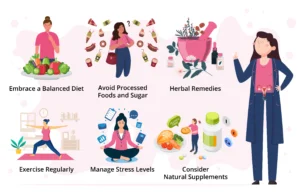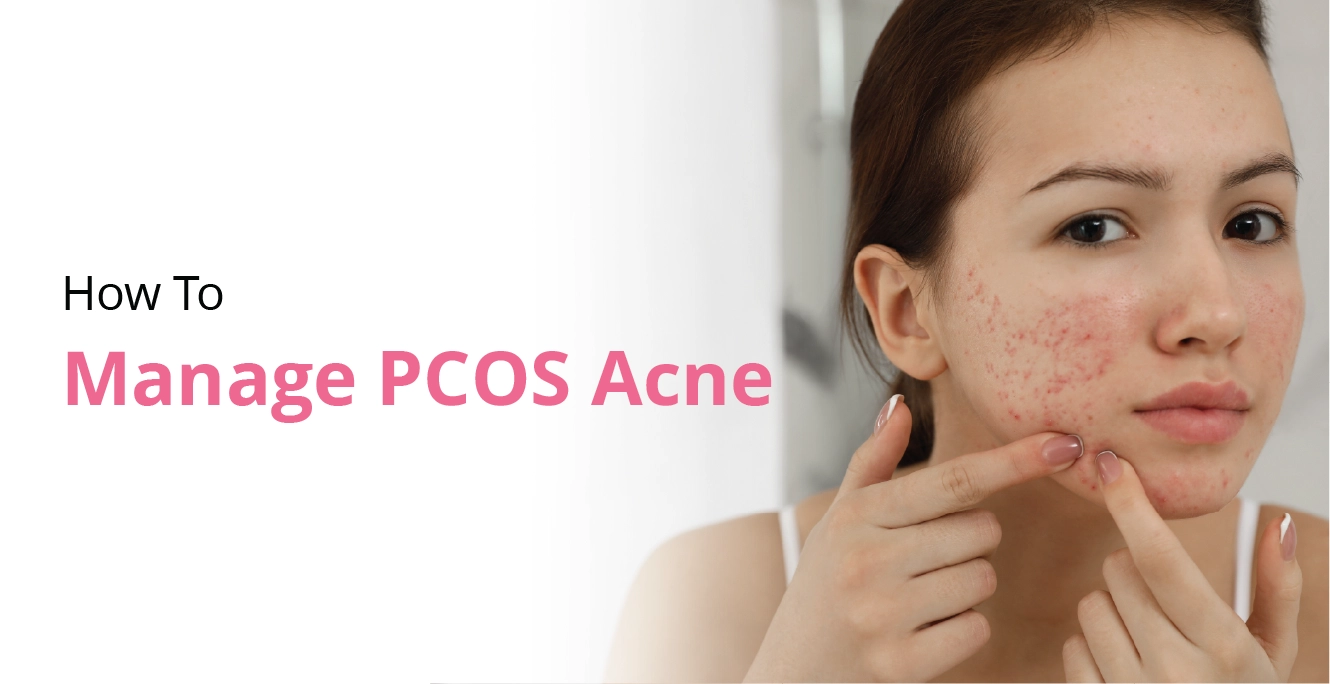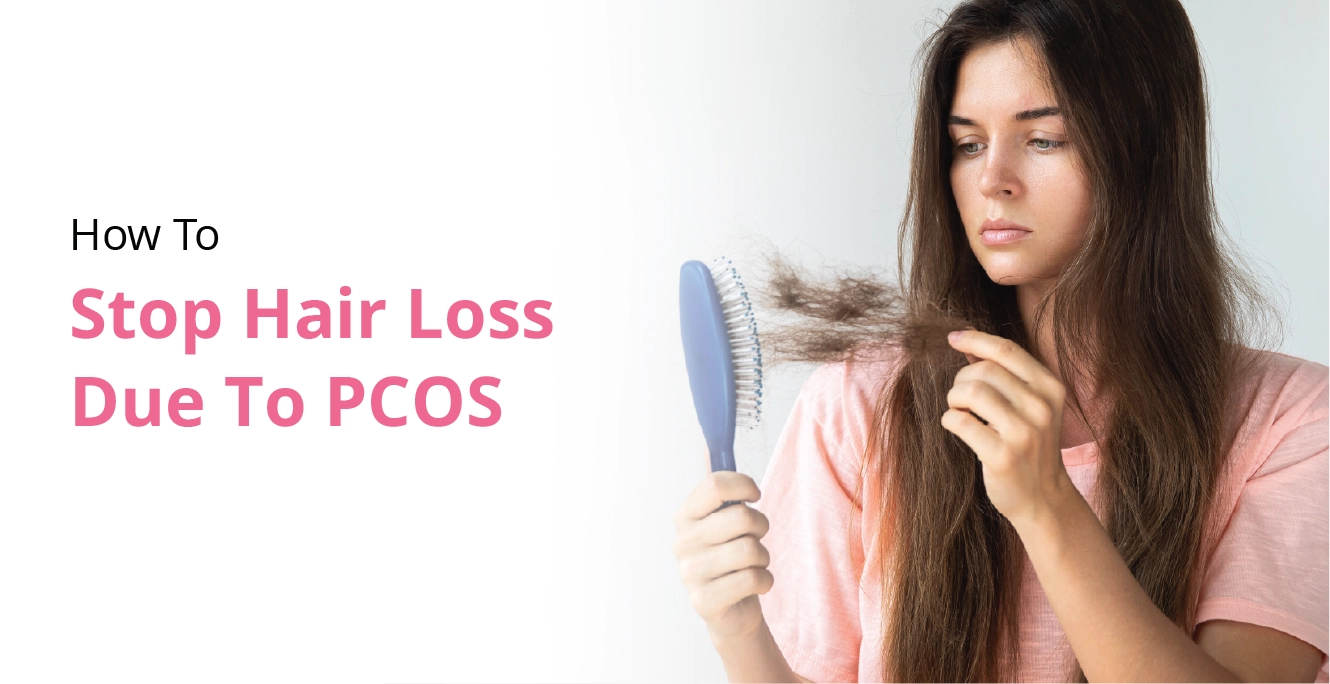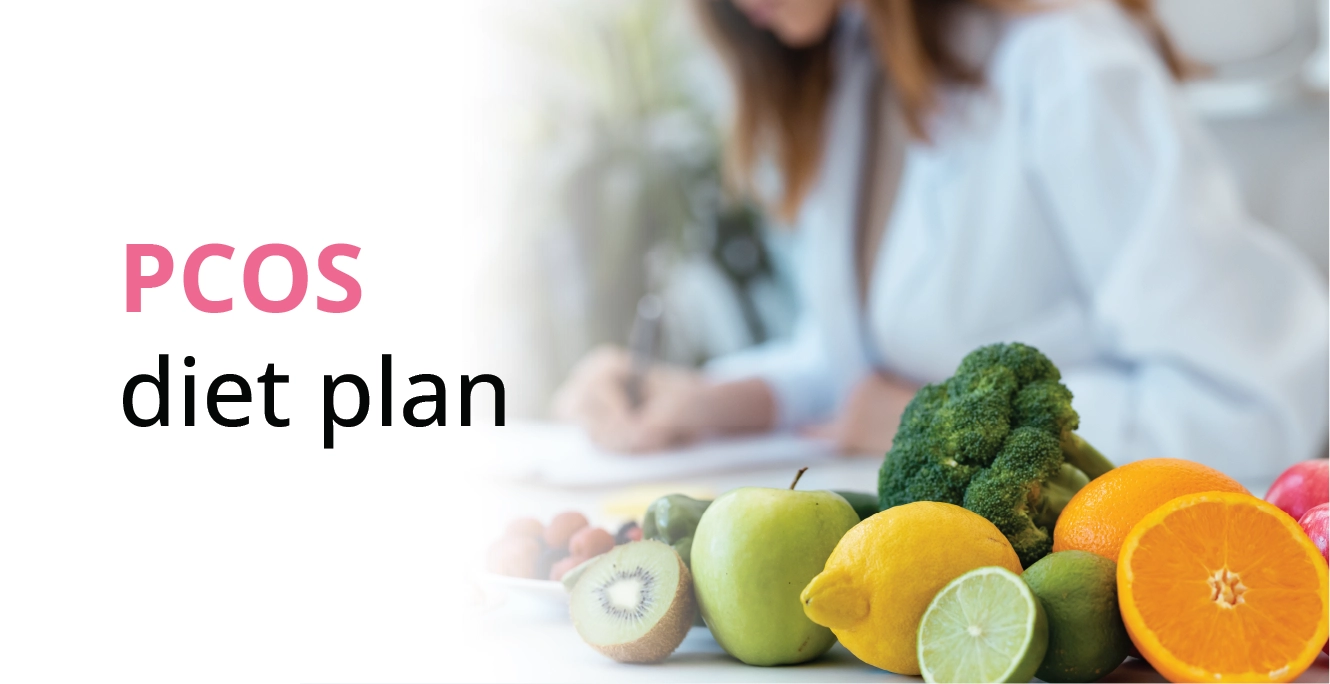
How To Reverse PCOS Naturally

Table of Contents
Are you tired of dealing with irregular periods, stubborn weight gain, and unwanted hair growth? You’re not alone. These are all significant signs and symptoms of Polycystic Ovary Syndrome (PCOS) that are largely becoming common among women in their reproductive age. According to the Press Information Bureau (PIB) –PCOS is rapidly becoming the most prevailing female endocrine disorder and a pre-eminent cause of infertility. Worldwide PCOS contributes to 6-26% of endocrine disorders and in India up to 3.7-22.5%, along with a range of symptoms which can be both physically and emotionally challenging.
Generally, “Can PCOS be reversed?’ is a common question asked by many women. So the answer to this is –PCOS as a condition can’t be reversed, but you can reverse PCOS symptoms. In this article, let’s understand how you can take control of your health and reverse PCOS symptoms naturally.
What is PCOS?
PCOS is a complex condition influenced by various factors, including genetics, lifestyle, and environmental factors. As per WHO, up to 70% of the affected population of women remain undiagnosed with PCOS worldwide.
This condition often comes with symptoms such as weight gain, acne, hirsutism (excessive hair growth), and infertility. Additionally, this increases the risk of miscarriage, preterm birth, gestational diabetes and can also impact the result of fertility treatments (IUI, IVF, and ICSI). Therefore, adopting a holistic approach to manage the symptoms can help reverse PCOS and improve your quality of life.
How to Reverse PCOS Naturally with Diet and Nutrition?

The following contributing factors can help you reverse PCOS symptoms naturally:
Embrace a Balanced Diet
Eating a balanced diet, rich in whole foods is crucial for managing PCOS symptoms. You can focus on consuming:
-
Whole Grains such as brown rice, quinoa, and oats, help regulate blood sugar levels.
-
Lean Proteins and legumes can maintain muscle mass and promote satiety.
-
Healthy Fats consumed from sources like avocados, nuts, seeds, and olive oil supports hormone production and can reduce inflammation.
-
Fiber-Rich Foods like vegetables, fruits, and legumes can help manage insulin levels and improve digestion.
Consider Natural Supplements
Considering natural supplements can help reverse PCOS symptoms. However, it’s essential to consult with your doctor before starting any new supplement regimen. Some beneficial supplements include:
-
Inositol: Inositol supplements, particularly a combination of myo-inositol and d-chiro-inositol, can help improve insulin sensitivity and regulate menstrual cycles while improving ovulation.
-
Omega-3 Fatty Acids: Omega-3 supplements from fish oil or flaxseed oil can reduce inflammation and support hormonal balance.
-
Vitamin D: Many women with PCOS have low vitamin D levels. Supplementing with vitamin D can improve insulin sensitivity and support overall health.
-
Chromium: Chromium supplements may help regulate blood sugar levels and reduce sugar cravings.
Herbal Remedies
No scientific research has proved that home or herbal remedies can reverse PCOS symptoms. And, consulting a specialist before using herbal remedies is always the best idea. However, according to Ayurveda, a few herbs have been shown to manage and improve some PCOS symptoms, such as:
-
Spearmint Tea: Drinking spearmint tea twice daily can help reduce androgen levels and improve symptoms of hirsutism.
-
Cinnamon: Cinnamon can help improve insulin sensitivity, regulate menstrual cycles and promote regular ovulation.
-
Saw Palmetto: Saw palmetto may reduce androgen levels and improve symptoms like acne and excessive hair growth.
-
Vitex (Chasteberry): This herb is known for balancing hormones and making your periods more regular.
-
Fenugreek seeds: They are known to help improve insulin sensitivity and balance hormones, which are key in managing PCOS symptoms naturally.
Foods to Avoid if You Have PCOS
Managing PCOS through diet is key to balancing hormones and improving overall health. While it’s important to focus on nourishing foods, knowing what to avoid is just as crucial. Here’s a guide to foods you should limit or avoid if you have PCOS:
-
Sugary foods and drinks: Sodas, sweets, and sugary baked goods can spike insulin levels, worsening hormonal imbalances.
-
Refined carbs: White bread, pasta, and rice cause blood sugar fluctuations, contributing to weight gain and aggravated symptoms.
-
Fried and processed foods: These often contain unhealthy fats and preservatives, triggering inflammation and disrupting hormone levels.
-
High-fat meats and full-fat dairy: These increase inflammation and promote weight gain, which can make PCOS harder to manage.
-
Trans fats: Found in many packaged snacks and fast food, these fats worsen insulin resistance.
-
Caffeine: Excessive caffeine may raise cortisol levels, disrupting hormone balance.
-
Foods with Endocrine-Disrupting Chemicals (EDCs): Processed foods and non-organic produce can worsen hormonal imbalances in PCOS. Choose organic and avoid plastic containers to reduce exposure.
Cutting back on these foods can prove beneficial in reversing PCOS and improving your overall well-being.
Other Ways to Reverse PCOS
While there’s no magic cure for PCOS, making certain lifestyle changes can help in reversing PCOS. Regular exercise and stress management play a crucial role in balancing hormones and improving overall well-being. Here are some ways to incorporate these practices into your routine:
Exercise Regularly
Engaging in regular physical activity is beneficial for managing PCOS as it helps improve insulin sensitivity, dramatically aids in weight management, and reduces stress levels. You can aim for at least 40-100 minutes of moderate-intensity exercise 3-4 times a week, including:
-
Cardio Exercises: Activities like walking, running, cycling, or swimming for at least 30 minutes daily can help improve cardiovascular health and burn calories.
-
Strength Training: Add strength training exercises to your routine to build muscle mass and boost metabolism.
-
Flexibility and Relaxation: Practicing yoga asanas, Pilates or minimal stretching can help you reduce stress and improve your hormonal balance.
Manage Stress Levels
Stress definitely worsens PCOS symptoms by increasing cortisol levels, which can lead to weight gain and hormonal imbalances. Therefore, practicing stress-reduction techniques becomes extremely important. Here are a few stress-reduction techniques you can include in your daily routine:
-
Mindfulness and Meditation: Practicing mindfulness and meditation can help calm the mind and reduce stress.
-
Deep Breathing Exercises: Simple deep breathing exercises for 5-10 minutes daily can help lower cortisol levels and promote relaxation.
-
Adequate Sleep: Ensure you get 7-9 hours of quality sleep each night to support overall health and hormone regulation.
Natural Treatments for PCOS
Contemporary treatments for PCOS often rely on medications like hormonal contraceptives or insulin-regulating drugs to manage symptoms. However, many women turn to natural therapies to address the root causes of the condition and promote long-term well-being. Here are some alternative treatment options that can help manage PCOS effectively:
-
Ayurveda: Rooted in ancient Indian healing, Ayurveda focuses on balancing the body’s doshas (vata, pitta, and kapha). Herbal formulations are often used to regulate hormones, improve ovulation, and reduce inflammation. Ayurveda also emphasises dietary changes to restore internal balance and support overall reproductive health.
-
Acupuncture: This traditional practice stimulates specific points on the body to restore energy flow and rebalance the endocrine system. Acupuncture has been shown to improve insulin sensitivity, regulate menstrual cycles, and reduce stress—key factors in managing PCOS symptoms effectively.
-
Naturopathy: Naturopathy uses a variety of natural therapies, including herbal medicine, detoxification, and nutrition. It focuses on strengthening the body’s innate ability to heal itself. By addressing hormonal imbalances and inflammation, naturopathy targets the root causes of PCOS, offering a holistic approach to treatment.
-
Yoga: Regular yoga practice helps manage PCOS by reducing stress, balancing hormones, and improving insulin sensitivity. Poses like Supta Baddha Konasana and Setu Bandhasana enhance blood flow to the pelvic area, promoting reproductive health and helping to regulate menstrual cycles.
These holistic approaches aim to treat PCOS from within, offering more personalised and side-effect-free solutions.
Conclusion
Reversing PCOS naturally involves a comprehensive approach that includes dietary changes, regular exercise, stress management, and the use of natural supplements and herbal remedies. By making these lifestyle modifications, you can manage and reverse PCOS symptoms effectively while improving your fertility, if you are planning to become pregnant. However, it is always suggested to consult a fertility expert or PCOS specialist before starting any new treatment or supplement regimen. With commitment and perseverance, you can definitely take control of your health and work towards reversing PCOS naturally.
FAQ
-
How can I avoid PCOS?
To reduce the risk of PCOS, focus on maintaining a healthy diet, staying active with regular exercise, managing stress, getting enough sleep, and minimising exposure to toxins.
Our Fertility Specialists
Related Blogs
To know more
Birla Fertility & IVF aims at transforming the future of fertility globally, through outstanding clinical outcomes, research, innovation and compassionate care.
Had an IVF Failure?
Talk to our fertility experts

 Our Centers
Our Centers













